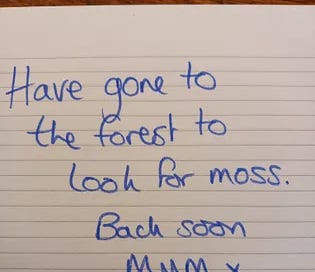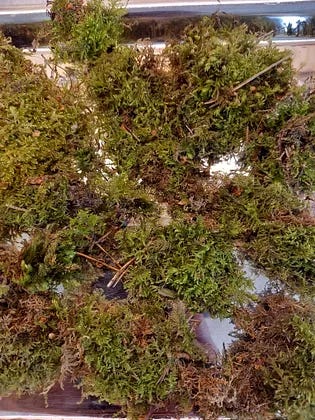On writer's block & moss
Slow creative process : taking notice of what lights you up : connecting ideas across the years
I am constantly curious about how difficult it feels for me to sit down and work on the book I’m writing.
These are the questions that go through my mind:
(BTW I am not looking for answers!)
Is it the wrong book? It is non-fiction. Would fiction be more fun?
Have I put too much pressure on it? I have caught myself calling it my life’s work and telling myself it will win prizes, while barely having drafted the introduction.
It is really about not having enough time? Not having enough money? Having to care for other people? Or not wearing myself out?
What am I scared of?
Does my brain not work in long-form? Would I be better off continuing to write short Substack newsletters? Though my brain works perfectly well with other people’s long-form projects!
Are my adjacent creative activities such as mandalas and journalling simply distractions? Some people seem to just get on with the writing and manage perfectly fine.
This week, I have reminded myself of the work of academics in the field of creative blocks and procrastination. For example:
These people all show the benefits of freewriting and of lowering the stakes of your writing session. For example, Joan Bolker’s book is entitled, Write Your Dissertation in Fifteen Minutes a Day.
I have been trying to have that light touch, no pressure daily contact with my book. I have two documents:
My working draft. This is a simple Word document. It is as tight a draft as I can manage. I read from the beginning or from where I know I was last happy with the draft. Then everything I am not happy with (notes, freewriting, unfinished bits) gets cut and pasted into document 2, my dump document.
My DUMP Doc. At the start of a writing session, I paste everything that doesn’t flow in the working draft into this document. I might paste it back again into the working draft during the writing process. But mostly I’ll rewrite it. Anything I’ve used, I change the colour of the text to grey.
It is a slow process. And everything is backed up by my research notes in Notion. I have settled on this rather than Capacities which I used last year as I find Notion’s databases easier for organising information.
These apps are brilliant for cross-pollination of ideas as long as you link them together when writing, like a commonplace book.
This week, I’ve also been reminded of the brilliance of slow writing. I love it when I have an idea for a workshop and realise that the same idea or theme has been lighting me up at different points over the years.
This week, it was moss.
For some reason, I felt it was important to write with, about and to moss. And to listen to what moss has to say. So I went off to find some to take into my creative writing workshop.
I then remembered reading and loving
’s The Signature of All Things in 2012 and this YouTube video of a conversation between Robin Wall Kimmerer and Lucy Jones ten years later in 2022. I found this brilliant article by Kimmerer and put the two writers together for my workshop. One looking at moss in fiction and one in non-fiction, but both saying such interesting things about it. And I’ve just realised another connection while writing this - moss is also slow!Some mossy quotes:
Robin Wall Kimmerer, Ancient Green article:
‘In the Anishinaabe languages of Skywoman, our words for moss, aasaakamig and aasaakamek, carry the meaning “those ones who cover the earth.” Soft, moist, protective, they turn time into life, covering the transient and softening the transition to another state.’
Elizabeth Gilbert, The Signature of All Things:
‘Mosses were typically defined by what they lacked, not by what they were, and, indeed, they lacked much. Mosses bore no fruit. Mosses had no roots. Mosses could grow no more than a few inches tall, for they contained no internal cellular skeleton with which to support themselves. Mosses could not transport water within their bodies. Mosses did not even engage in sex. (Or at least they did not engage in sex in any obvious manner, unlike lilies or apple blossoms—or any other flower, in fact—with their overt displays of male and female organs.) Mosses kept their propagation a mystery to the naked human eye. For that reason, they were also known by the evocative name Cryptogamae—”hidden marriage.”’
‘Moss is inconceivably strong. Moss eats stone; scarcely anything, in return, eats moss. Moss dines upon boulders, slowly but devastatingly, in a meal that lasts for centuries. Given enough time, a colony of moss can turn a cliff into gravel, and turn that gravel into topsoil. Under shelves of exposed limestone, moss colonies create dripping, living sponges that hold on tight and drink calciferous water straight from the stone. Over time, this mix of moss and mineral will turn into travertine marble. Within that hard, creamy-white marble surface, one will forever see veins of blue, green, and gray—the traces of the antediluvian moss settlements. St Peter’s Basilica itself was built from the stuff, both created by and stined with the bodies of ancient moss colonies.
‘Moss grows where nothing else can grow. It grows on bricks. It grows on tree bark and roofing slate. It grows in the Arctic Circle and in the balmiest tropics; it also grows on the fur of sloths, on the backs of snails, on decaying human bones. Moss, Alma learned, is the first sign of botanic life to reappear on land that has been burned or otherwise stripped down to barrenness. Moss has the temerity to begin luring the forest back to life. It is a resurrection engine. A single clump of mosses can lie dormant and dry for forty years at a stretch, and then vault back again into life with a mere soaking of water.’
Paid subscribers - if you can get hold of some moss to write with on Tuesday, bring it along!
I have more to say about moss. And I know I’ll return to it. I love that Substack is like my digital notebook, where I reflect on writing and the creative process. And there is a gentle, slow unfolding of my ideas.
I have been reading advice about writing on Substack saying stick to one point, make it about the reader etc. But bringing ideas together is what I do best and sometimes it’s only by writing that I discover the connections.
Thank you for reading my meanderings. Thank you for being here.
My workshops this summer have my usual mix of creativity and craft, with some reflection too. During the 2-part workshop, Sepia Summer, we’ll be taking a nostalgic look at summer memories and seeing how to turn those into a piece of writing. And in REWILD (for paid subscribers), we’ll be experimenting with language as well as feeling freer on the page while connecting with nature, moon cycles and the seasons.
Creative Writing Workshops
Sepia Summer: Two-Part Creative Writing Course
Long, slow, hot days. Deckchairs, ice cream, sandcastles, splashing in the waves. What do you remember about the summers of your past?
Maybe there’s a particular summer you always return to in your mind or maybe your summers have merged into a golden glow.
In this 2-part creative writing course, we take a nostalgic look at summer memories and explore how to turn them into a piece of writing.
In-person (Chequer Mead, East Grinstead)
Saturday 28 June - 10-12noon
& Saturday 12 July - 10-12noon
To book a place on the in-person workshops, click here.
Regular events with me (Mel Parks)
Online
Rewild: A weekly guided creative writing hour
Rewild your writing! Connect with the seasons, moon cycles, nature as well as ancient stories & wisdom. Experiment, explore, break free of writing conventions & celebrate your creativity.
Prompts offered, followed by quiet time to write, a check in half way through, then sharing at the end.
Series of 11 weekly hour-long sessions.
For paid subscribers:
Tuesdays 2-3pm (UK time)
Ends 15 July. Doesn’t matter that you’ve missed the beginning sessions. Join us at any time.
Online
My Book Writing Adventure - Support Group on Zoom
My Book Writing Adventure is a gentle, experimental, pick ‘n’ mix, self-directed book coaching programme for people with full enough lives who are driven to write a book despite everything.
For paid subscribers:
All UK time and planned to coincide with the full moon
2025
Friday 13 June | 9.30am - 10.30am
If you are local to Forest Row, I’ll be offering one-to-one sessions to have a chat about any writing dilemmas as part of Forest Row Festival on 14 June. I’ll be in the Spring Room at the Community Centre from 10am to 12noon. Come and say ‘hi’ or better still, book a 20 min slot with me. Included in price of festival wristband or for a donation to the festival.
In person
Becoming a Writer: Monthly Creative Writing Group
A monthly creative writing workshop for beginners. Plenty of fun writing prompts, games and activities to get your creative juices flowing.
Chequer Mead, East Grinstead
Tuesday 10 June | 7-9pm
Click here to find out more and to book a place.
Click here to pay for three summer workshops for the price of two.
Until next time…









Thanks as always for your insightful sharing. I resonated with every single one of your questions Mel. I wonder about redefining "writer's block" and "procrastination" for myself - perhaps my writing process is simply as slow and steady as moss and tortoises. And that's OK.